- Home
- Krav Maga Blog
- Krav Instructors
- Train in Israel
- Tour Train Israel
- Krav Shop
- DVD
- Kickboxing
- IKI Near Me
- Seminars
- IKI Membership
- On-Line Training
- Krav Maga Training
- Testimonials
- History Krav Maga
- Instructors Page
- Past Blogs
- Spanish
- Italian
- Certification
- Contact
- Holland Seminar
- Vienna Seminar
- Poland Seminar
- Italy Seminar
- Belt Requirements
Toys Karate Mastery
By Moshe Katz
CEO
Israeli Krav International
June 14, 2019, Israel

Legitimate IKI Krav Maga diploma, printed in Israel
Yesterday I visited my printer, Tomer, to print some more IKI Krav Maga rank certificates. Tomer is a wonderful friendly man, provides great service with a smile and is an expert in his field. I love speaking with those who are experts in their fields, whether it is cousin Albert discussing electronics or Tomer discussing printing. Tomer knows the history of printing, when and where printing began and which was the first book ever to be printed (the Bible). He can discuss quality of paper, color, print, light, tone, etc. He knows it all and you can feel confident putting your work into his hands.
It should be the same with martial arts instructors, but it is not. Many have not paid their dues, many have not "served the master".
There is an old expression, "A jack of all trades, a master of none". This refers to one who dabbles in learning a little bit in one field, and then a little bit of another. He might make an interesting conversation partner but unlike Tomer the printer you should not trust your work to him.
Let us look at children, a child will enjoy a toy for a while but soon get bored and want a new toy, he will soon be bored of this as well. Take him to the Shopping Center and he will notice other toys in the store, this will catch his eye and he will want them as well. The parents will end up spending a lot of money and the result will only be a spoiled child.
Let us take another child, he has only one toy, a violin. He plays his violin all the time. When he is bored, he takes out his violin, when he is sad he takes out his violin and plays a piece, when he is happy he plays a happy tune on the violin. This child will some day grow into a master violin player. The other child will have nothing but a bunch of broken old toys.
There is another old expression; you have to pay your dues. What this means is you have to spend a lot of time with one master, even though at times it will be gruelling and boring, but if you want to be a master - you must.
There is the old story told by the great karate master Gichin Funakoshi about a young boy who was learning the Japanese art of reciting poetry. The young boy was taught only one poem which he was made to recite again and again. Finally in frustration he ran away. Alone, and without money he entered a local poetry reading competition, to earn some money for food. His recitation was so beautiful that the audience shed tears and said, truly you are blessed to have such a teacher who has taught you so well.
The boy started crying. The guests asked what was the matter? He explained that just recently he had deeply insulted his teacher, called him an old fool, and ran off to seek a better teacher who would teach him a variety of poetry, not just one poem. The young man realized his error, returned to his teacher and apologized.
He began his training again.
Master Funakoshi said this was how he was trained; he would repeat the same karate kata over and over again, without a word of encouragement, until his mater said, Next.
I recall the words of my karate instructor, the great Saiko Shihan (later Soshu) Shigeru Oyama. He wrote the following words:
"In order to learn any technique you must practice it over and over again, then practice it some more."
He discusses how people in the modern world seek easier ways to learn, more exciting ways to learn. He writes, "This is the wrong way. You can never master any technique by this method." When I spoke with him personally he described the idea of learning the "basics" of a style. This meant a minimum of five years with an instructor.
The words of Oyama and the discipline of the training at the Oyama dojo are still with me, although I may teach a different style these days the fundamental core of training is the same idea. I am greatly honored that our chief instructor in New York, Shihan Ervin Velez, a close confidant of Soshu Oyama, discussed IKI Krav Maga with Oyama. Soshu Oyama showed a great interest and asked Shihan Velez to show him some of the techniques the next time they met. Sadly Oyama passed away a few days later, but yet I feel the cycle was complete and I am honored that Master Oyama showed an interest in our Krav Maga.
The ethic that I am trying to teach here is devotion to a system, not a blind faith, not a religious commitment but a dedication to mastering a system. This cannot be done by being certified in numerous styles of the same system. Imagine if you saw a karate master with a website that boasted certification in Shotokan, Gojo Ryu, Kyokushin, Seido karate, Wado ryu and Isshinryu karate. These are contradictory styles, you cannot be a master of all them at once.
Some think that by learning many styles you are gaining more wisdom, like a bee that drinks from many flowers. No traditional instructor will agree with this. What you are doing in fact is learning contradictory systems, so it is not 1 +1 =2, but rather 1-1 = 0. You end up not doing any style well, you end up confusing your students.
You cannot be teaching styles that contradict each other. You must choose a path and as Master Oyama said, stick to it until you have mastered it.
"Be sure you approach your basic technique training with dedication and humility. This is very important. Never assume you have mastered any basic technique, no matter your rank. Always return to the basics which are the foundations of Karate." (Shigeru Oyama)

a younger Moshe visiting and paying respect to Karate master Saiko Shihan Shigeru Oyama. It was a great opportunity for training, discussing martial arts philosophy and teaching approaches.
About the Author
Moshe Katz began his training in Israel in traditional karate, eventually training in Shurin ryu, Kyokushin and Shotokan (due to availability where he lived). He then spent 18 years training with Itay Gil in Krav Maga and free style Kickboxing, 3 times per week, 3 lessons each day (the maximum available) plus many Special training days and seminars.
Certified by Wingate Institute and recognized world wide Moshe has taught over 800 international seminars including military, police, civilians, college and high schools groups.